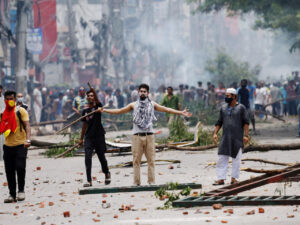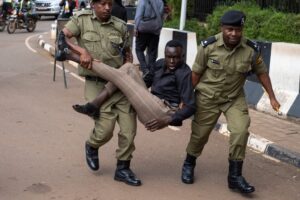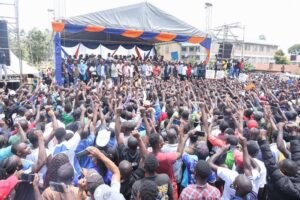Over 1,000 Arrested and 174 Dead in Bangladesh’s Deadly Protests
VICTOR KIPCHUMBA July 23, 2024 0
Protesters in Bangladesh
Protests Spark Widespread Unrest
In Bangladesh, violence has led to over 1,000 arrests in recent days. Protests over employment quotas have triggered massive unrest. The number of deaths has risen to at least 174, including several police officers. This unrest marks some of the worst violence during Prime Minister Sheikh Hasina’s tenure.
Government Response
Authorities imposed a curfew and deployed soldiers across the country. A nationwide internet blackout disrupted daily life and restricted information flow. On Sunday, the Supreme Court reduced reserved jobs for specific groups, including descendants of Bangladesh’s 1971 liberation war fighters.
Suspension of Protests
The student group leading the protests suspended their demonstrations for 48 hours. Their leader stated they did not want reform “at the expense of so much blood.” Despite this, restrictions remained in place. The army chief claimed the situation was “under control.”
Life Under Curfew
Dhaka experienced heavy military presence with bunkers at intersections and roads blocked with barbed wire. However, more people and rickshaws appeared on the streets. Rickshaw driver Hanif expressed his struggle, saying, “If I don’t do it, my family will go hungry.”
Missing Leaders and Criticism
The head of Students Against Discrimination, the main protest group, reported being abducted and beaten. The group claimed at least four of its leaders were missing. They asked authorities to “return” them by the evening.
International Reaction
Bangladeshi Nobel Peace Prize laureate Muhammad Yunus criticized the government’s response. Yunus urged “world leaders and the United Nations” to end the violence. He claimed young people were being “killed at random” and hospitals were hiding the true number of casualties.
Diplomatic Concerns
Diplomats in Dhaka questioned the government’s actions. US Ambassador Peter Haas criticized a one-sided video shown at a diplomatic briefing. Government officials have consistently blamed protesters and opposition for the unrest.
Arrests Across Bangladesh
During the violence, police arrested around 200 people in Narayanganj and Narsingdi. At least 80 were held in Bogra. In Gazipur, 168 arrests occurred, while Rangpur saw 75 and Barisal 60. In Dhaka, police arrested 80 more people, bringing the total to 1,195.
Employment Quotas and Unrest
Bangladesh faces an acute jobs crisis with around 18 million unemployed youth. The reintroduction of the quota scheme in June upset many graduates. On Sunday, the Supreme Court reduced reserved jobs from 56% to 7%, mostly for “freedom fighters’ descendants.” However, protesters still demand the removal of this category.
Hasina’s Position
Prime Minister Sheikh Hasina approved the implementation of the Supreme Court’s judgement late Monday. Critics accuse her of using the quota system to favor loyalists. Her government is also criticized for misusing state institutions to maintain power.
Hasina’s Resilience
Despite the violence, Hasina declared, “Sheikh Hasina never flees.” Her tenure since 2009 has seen repeated allegations of entrenching power and silencing dissent. Speculation about her future continues as the country faces turmoil.
The unrest in Bangladesh reveals deep divisions over employment quotas and government policies. The violence has led to significant casualties and widespread arrests. With curfews and military presence, the situation remains tense. The international community watches closely as Bangladesh navigates this crisis.





